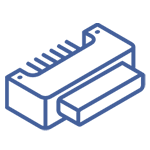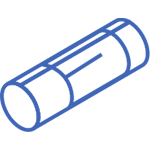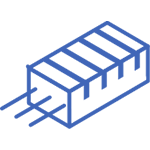

Phoenix Contact FBS10-5
Manufacturer No:
FBS10-5
Tiny WHSLManufacturer:
Utmel No:
1894-FBS10-5
Package:
-
Description:
Jumper (Busbar)
Quantity:
Delivery:





Payment:











In Stock : Please Inquire
Please send RFQ , we will respond immediately.
United States
China
Canada
Japan
Russia
Germany
United Kingdom
Singapore
Italy
Hong Kong(China)
Taiwan(China)
France
Korea
Mexico
Netherlands
Malaysia
Austria
Spain
Switzerland
Poland
Thailand
Vietnam
India
United Arab Emirates
Afghanistan
Åland Islands
Albania
Algeria
American Samoa
Andorra
Angola
Anguilla
Antigua & Barbuda
Argentina
Armenia
Aruba
Australia
Azerbaijan
Bahamas
Bahrain
Bangladesh
Barbados
Belarus
Belgium
Belize
Benin
Bermuda
Bhutan
Bolivia
Bonaire, Sint Eustatius and Saba
Bosnia & Herzegovina
Botswana
Brazil
British Indian Ocean Territory
British Virgin Islands
Brunei
Bulgaria
Burkina Faso
Burundi
Cabo Verde
Cambodia
Cameroon
Cayman Islands
Central African Republic
Chad
Chile
Christmas Island
Cocos (Keeling) Islands
Colombia
Comoros
Congo
Congo (DRC)
Cook Islands
Costa Rica
Côte d’Ivoire
Croatia
Cuba
Curaçao
Cyprus
Czechia
Denmark
Djibouti
Dominica
Dominican Republic
Ecuador
Egypt
El Salvador
Equatorial Guinea
Eritrea
Estonia
Eswatini
Ethiopia
Falkland Islands
Faroe Islands
Fiji
Finland
French Guiana
French Polynesia
Gabon
Gambia
Georgia
Ghana
Gibraltar
Greece
Greenland
Grenada
Guadeloupe
Guam
Guatemala
Guernsey
Guinea
Guinea-Bissau
Guyana
Haiti
Honduras
Hungary
Iceland
Indonesia
Iran
Iraq
Ireland
Isle of Man
Israel
Jamaica
Jersey
Jordan
Kazakhstan
Kenya
Kiribati
Kosovo
Kuwait
Kyrgyzstan
Laos
Latvia
Lebanon
Lesotho
Liberia
Libya
Liechtenstein
Lithuania
Luxembourg
Macao(China)
Madagascar
Malawi
Maldives
Mali
Malta
Marshall Islands
Martinique
Mauritania
Mauritius
Mayotte
Micronesia
Moldova
Monaco
Mongolia
Montenegro
Montserrat
Morocco
Mozambique
Myanmar
Namibia
Nauru
Nepal
New Caledonia
New Zealand
Nicaragua
Niger
Nigeria
Niue
Norfolk Island
North Korea
North Macedonia
Northern Mariana Islands
Norway
Oman
Pakistan
Palau
Palestinian Authority
Panama
Papua New Guinea
Paraguay
Peru
Philippines
Pitcairn Islands
Portugal
Puerto Rico
Qatar
Réunion
Romania
Rwanda
Samoa
San Marino
São Tomé & Príncipe
Saudi Arabia
Senegal
Serbia
Seychelles
Sierra Leone
Sint Maarten
Slovakia
Slovenia
Solomon Islands
Somalia
South Africa
South Sudan
Sri Lanka
St Helena, Ascension, Tristan da Cunha
St. Barthélemy
St. Kitts & Nevis
St. Lucia
St. Martin
St. Pierre & Miquelon
St. Vincent & Grenadines
Sudan
Suriname
Svalbard & Jan Mayen
Sweden
Syria
Tajikistan
Tanzania
Timor-Leste
Togo
Tokelau
Tonga
Trinidad & Tobago
Tunisia
Turkey
Turkmenistan
Turks & Caicos Islands
Tuvalu
U.S. Outlying Islands
U.S. Virgin Islands
Uganda
Ukraine
Uruguay
Uzbekistan
Vanuatu
Vatican City
Venezuela
Wallis & Futuna
Yemen
Zambia
Zimbabwe
You may place an order without registering to Utmel.
We strongly suggest you sign in before purchasing as you can track your order in real time.
For your convenience, we accept multiple payment methods in USD, including PayPal, Credit Card, and wire transfer.
RFQ (Request for Quotations)It is recommended to request for quotations to get the latest prices and inventories about the part.
Our sales will reply to your request by email within 24 hours.
1. You'll receive an order information email in your inbox. (Please remember to check the spam folder if you didn't hear from us).
2. Since inventories and prices may fluctuate to some extent, the sales manager is going to reconfirm the order and let you know if there are any updates.
- TypeParameter
- Contact Plating
Contact plating (finish) provides corrosion protection for base metals and optimizes the mechanical and electrical properties of the contact interfaces.
Lead, Tin - Mount
In electronic components, the term "Mount" typically refers to the method or process of physically attaching or fixing a component onto a circuit board or other electronic device. This can involve soldering, adhesive bonding, or other techniques to secure the component in place. The mounting process is crucial for ensuring proper electrical connections and mechanical stability within the electronic system. Different components may have specific mounting requirements based on their size, shape, and function, and manufacturers provide guidelines for proper mounting procedures to ensure optimal performance and reliability of the electronic device.
Through Hole - Material
In electronic components, the parameter "Material" refers to the substance or material used in the construction of the component. The choice of material is crucial as it directly impacts the component's performance, durability, and other characteristics. Different materials have varying properties such as conductivity, resistance to heat, corrosion resistance, and mechanical strength, which determine how the component functions in a circuit. Common materials used in electronic components include metals like copper and aluminum, semiconductors like silicon, insulators like ceramics and plastics, and various alloys. Selecting the appropriate material is essential for designing reliable and efficient electronic components.
COPPER - RoHSNon-Compliant
- Pitch Spacing-
- For Use WithConnectors
- Rohs CodeYes
- Manufacturer Part NumberFBS10-5
- ApprovalsEAC; UL
- ManufacturerPhoenix Contact
- Part Life Cycle CodeActive
- Ihs ManufacturerPHOENIX CONTACT GMBH & CO KG
- Risk Rank5.41
- Packaging
Semiconductor package is a carrier / shell used to contain and cover one or more semiconductor components or integrated circuits. The material of the shell can be metal, plastic, glass or ceramic.
Tape & Reel - Tolerance
In electronic components, "tolerance" refers to the acceptable deviation or variation from the specified or ideal value of a particular parameter, such as resistance, capacitance, or voltage. It indicates the range within which the actual value of the component can fluctuate while still being considered acceptable for use in a circuit. Tolerance is typically expressed as a percentage or a specific value and is important for ensuring the accuracy and reliability of electronic devices. Components with tighter tolerances are more precise but may also be more expensive. It is crucial to consider tolerance when selecting components to ensure proper functionality and performance of the circuit.
2 % - Temperature Coefficient
The resistance-change factor per degree Celsius of temperature change is called the temperature coefficient of resistance. This factor is represented by the Greek lower-case letter “alpha” (α). A positive coefficient for a material means that its resistance increases with an increase in temperature.
100 ppm/°C - Resistance
Resistance is a fundamental property of electronic components that measures their opposition to the flow of electric current. It is denoted by the symbol "R" and is measured in ohms (Ω). Resistance is caused by the collisions of electrons with atoms in a material, which generates heat and reduces the flow of current. Components with higher resistance will impede the flow of current more than those with lower resistance. Resistance plays a crucial role in determining the behavior and functionality of electronic circuits, such as limiting current flow, voltage division, and controlling power dissipation.
56 Ω - Max Operating Temperature
The Maximum Operating Temperature is the maximum body temperature at which the thermistor is designed to operate for extended periods of time with acceptable stability of its electrical characteristics.
150 °C - Min Operating Temperature
The "Min Operating Temperature" parameter in electronic components refers to the lowest temperature at which the component is designed to operate effectively and reliably. This parameter is crucial for ensuring the proper functioning and longevity of the component, as operating below this temperature may lead to performance issues or even damage. Manufacturers specify the minimum operating temperature to provide guidance to users on the environmental conditions in which the component can safely operate. It is important to adhere to this parameter to prevent malfunctions and ensure the overall reliability of the electronic system.
-65 °C - Composition
Parameter "Composition" in electronic components refers to the specific materials and substances used in the construction of the component. It encompasses the chemical and physical elements that make up the component, influencing its electrical, thermal, and mechanical properties. The composition can affect the performance, reliability, and durability of the component in various applications. Understanding the composition is essential for optimizing the design and functionality of electronic devices.
Metal Film - MIL Conformance
MIL Conformance refers to the compliance of electronic components with military standards set by the Department of Defense. These standards define rigorous requirements for reliability, performance, and durability under extreme conditions. Components that meet MIL Conformance are often used in defense, aerospace, and other critical applications where failure is not an option. Adherence to these standards ensures that the components can withstand harsh environments, such as extreme temperatures, vibrations, and humidity.
NO - DIN Conformance
DIN Conformance refers to the compliance of an electronic component with the standards set by the Deutsches Institut für Normung (DIN), which is the German Institute for Standardization. DIN standards cover a wide range of technical specifications and requirements for various products, including electronic components. When a component is labeled as DIN-conformant, it means that it meets the specific criteria outlined by DIN for factors such as dimensions, materials, performance, and safety. Ensuring DIN conformance helps to guarantee interoperability, quality, and reliability of electronic components in various applications and industries. Manufacturers often adhere to DIN standards to demonstrate the quality and reliability of their products to customers and to ensure compatibility with other DIN-compliant devices.
NO - IEC Conformance
IEC Conformance refers to the compliance of electronic components with standards set by the International Electrotechnical Commission (IEC). These standards ensure that the components meet specific safety, performance, and interoperability criteria. Adhering to IEC conformance helps manufacturers produce reliable and compatible products, facilitating international trade and promoting consumer safety. Components that conform to IEC standards are often preferred in global markets due to their quality assurance and regulatory acceptance.
NO - Reach Compliance Code
Reach Compliance Code refers to a designation indicating that electronic components meet the requirements set by the Registration, Evaluation, Authorization, and Restriction of Chemicals (REACH) regulation in the European Union. It signifies that the manufacturer has assessed and managed the chemical substances within the components to ensure safety and environmental protection. This code is vital for compliance with regulations aimed at minimizing risks associated with hazardous substances in electronic products.
compliant - Military Standard
Military Standard in electronic components refers to a set of guidelines and specifications established by the military for the design, manufacturing, and testing of electronic devices used in military applications. These standards ensure that the components meet specific requirements for reliability, durability, performance, and environmental conditions. Components that meet military standards are often more rugged and capable of withstanding harsh operating conditions such as extreme temperatures, vibrations, and electromagnetic interference. Adhering to military standards helps to ensure the quality and consistency of electronic components used in critical military systems and applications.
MIL-PRF-39017 - Connector Support Type
Connector Support Type refers to the specific design or configuration of a connector that is used to support and secure electronic components or devices. This parameter describes the physical characteristics and features of the connector that enable it to effectively connect, hold, and provide stability to the components it is designed for. The support type may include factors such as the shape, size, material, mounting method, and locking mechanism of the connector, all of which contribute to its ability to securely hold the components in place and maintain a reliable electrical connection. Understanding the connector support type is important for selecting the appropriate connector that will ensure proper functionality and durability of the electronic system.
TERMINAL BLOCK ACCESSORY - Accessory Type
Accessory Type in electronic components refers to additional items or attachments that enhance the functionality or usability of primary components. These can include connectors, adapters, mounting hardware, and protective casings. Accessory Types are essential for ensuring compatibility and achieving optimal performance in electronic systems.
Plug-In Bridge - Assembly Item Name
In the context of electronic components, the parameter "Assembly Item Name" typically refers to the specific name or identifier assigned to a particular electronic component within an assembly or system. This name helps to uniquely identify the component and distinguish it from others in the assembly. It is often used in documentation, inventory management, and during the assembly process to ensure accurate identification and tracking of components. The Assembly Item Name may include information such as the manufacturer's part number, a specific model or version designation, or any other relevant details that help identify the component within the assembly.
JUMPER ITEM - Used With
The parameter "Used With" in electronic components refers to the specific devices or components that the particular component is designed to work with or be connected to. It indicates compatibility and interoperability between different components within an electronic system. Understanding the "Used With" parameter is crucial for selecting the right components for a given application to ensure proper functionality and performance. It helps in identifying the dependencies and requirements for integrating the component into a larger electronic system or circuit. Checking the "Used With" information can also help in troubleshooting and diagnosing issues related to component compatibility in electronic designs.
MODULAR TERMINAL BLOCKS - Length11.43 mm
- Diameter
In electronic components, the parameter "Diameter" typically refers to the measurement of the width of a circular component, such as a resistor, capacitor, or inductor. It is a crucial dimension that helps determine the physical size and fit of the component within a circuit or on a circuit board. The diameter is usually measured in millimeters (mm) or inches (in) and is important for ensuring proper placement and soldering of the component during assembly. Understanding the diameter of electronic components is essential for selecting the right size for a specific application and ensuring compatibility with other components and the overall design of the circuit.
3.51 mm - Radiation Hardening
Radiation hardening is the process of making electronic components and circuits resistant to damage or malfunction caused by high levels of ionizing radiation, especially for environments in outer space (especially beyond the low Earth orbit), around nuclear reactors and particle accelerators, or during nuclear accidents or nuclear warfare.
No

















